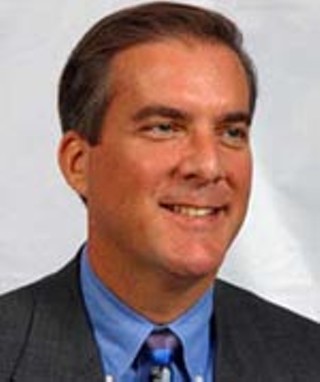Williamson DA Puts the Squeeze on Defense Bar
John Bradley sees nothing wrong with compelling testimony about indicted clients
By Jordan Smith, Fri., Dec. 31, 2004

On Dec. 16, local defense attorneys packed Williamson Co. District Judge Burt Carnes' courtroom in support of one of their own, Georgetown-based lawyer Robert Phillips, who was in court to fight a grand jury subpoena issued by the office of District Attorney John Bradley. The state was aiming to force Phillips to testify about the content of a June interview he conducted with a client's daughter – a client that the state was asking the same grand jury to indict for sexual assault of the daughter Phillips interviewed. Although the DA's office pursued the Phillips subpoena for more than four months, prosecutors backed down in court and agreed to withdraw it. "The state agreed to withdraw their subpoena and we agreed to withdraw our motion to quash [the subpoena]," said Phillips' attorney Gerald Goldstein, a member of the Texas Criminal Defense Lawyers Association strike force team. "I'd say it was a good standoff – or a stand-down."
Although seemingly minor, if the state's bid to force Phillips into the witness chair had been successful, it would have a potentially devastating impact on the ability of defense attorneys to investigate their clients' cases and to provide their clients a zealous defense. Indeed, the content of the interview in question was Phillips' confidential work product – ordinarily safe from the state's reach – and forcing Phillips to turn state witness could render him incapable of defending his client. Hence the concerns of the defense bar that, if Phillips and other attorneys were forced to testify, the state's powers would border on invincible and effective defense could be rendered meaningless.
On June 7, Phillips had a client in jail. The man (whom Phillips declined to name) was picked up by Williamson Co. sheriff's deputies and plunked behind bars that day based on an "outcry" of sexual abuse made by his 9-year-old stepdaughter. During a therapy session two days before, the girl revealed that on a recent evening her stepfather had touched her genitals after she'd climbed into bed with her parents, seeking refuge from a stormy evening and nightmares. When sheriff's deputies arrived at the house two days later, they asked the girl's mother to call the stepfather and ask him about the girl's allegation (a conversation that Phillips alleges was recorded illegally).
Phillips said his client told the girl's mother that he couldn't imagine that the girl would lie about being assaulted, but that he didn't do anything and that he didn't know why she'd say he had. It was a troubling allegation, at least in part because it had happened before – the girl had been sexually abused by the mother's prior husband, who was subsequently prosecuted in Williamson Co. and sent to prison. Still, armed with the recording of his client's telephone conversation, but without ever talking to the girl, the deputies arrested Phillips' client.
Within 24 hours of the arrest, the girl's story began to change. She wasn't sure if he'd really touched her, she told her mother, "because she'd been having dreams all the time about the other fellow," Phillips said. And the mother was "not sure at all that her new husband had done this because the child was a mess therapeutically," he said. The mother told Phillips what was happening and brought the girl to Phillips' office to talk. On June 10, Phillips set up a tape recorder and interviewed the girl in the presence of her mother, witnessed by one of Phillips' employees. During the interview, he said, the girl said she wasn't sure whether she'd actually been assaulted or whether she'd been having another nightmare. The information, of course, would be integral to defending his client, if the man was ever indicted on a charge of child sexual assault.
For whatever reason, at the time Phillips interviewed the girl she had not yet been interviewed by anyone from the state – even though she would be their most important witness. During his 25-year career – seven of them spent as a prosecutor, two with the Williamson Co. DA's office – Phillips said he'd never seen a case where the state had put off an interview with the complaining witness. "It was striking in my mind how slowly they went about the process," he said.
But the fact that Phillips talked to the girl before they did, so early in the case, ticked off the Williamson Co. prosecutors, who, in August, issued Phillips a grand jury subpoena. The state withdrew the original subpoena after Phillips' lawyers agreed to provide a copy of the tape recording of the interview with the girl, but because there were problems with the quality of the recording the state reissued the subpoena in early December, again trying to secure Phillips' live testimony. Phillips resisted and instead offered the testimony of his employee who witnessed the interview. To date, the DA's office has not issued her a subpoena.
In part, the offer suggested that there were – and are – other avenues available to the DA's office to secure evidence without taking the treacherous step of subpoenaing Phillips and placing in jeopardy his role as advocate. But Bradley said he doesn't see things that way and doesn't think that there's anything particularly unique or threatening about his office's attempt to secure Phillips' testimony. "The grand jury subpoena process is pretty standard," he said. His office has subpoenaed defense attorneys in the past and has "always been successful" in getting from them the evidence prosecutors need, "sometimes through testimony, sometimes through written statements."
According to Bradley, Phillips made himself a material witness in the case when he "grabbed up" the girl for an interview before the police had a chance to question her. When asked why the state hadn't interviewed her either prior to her stepfather's arrest or in the days following it, Bradley backtracked, saying that law enforcement officials had interviewed her. The problem, he said, was that Phillips interviewed her before she'd been taken to the Child Advocacy Center, whose employees are trained in the art of conducting a "neutral" interview.
When dealing with a child victim, the goal is to "reduce the amount of stress the child has to go through when reporting abuse," Bradley said, and to avoid the child having to tell their story to people, like Phillips, who don't have the "training or skills to conduct an interview of this type." It becomes "very awkward" when "defense attorneys get involved," he said. Nonetheless, he said he doesn't see anything "unique" or contentious about his office's bid to force Phillips in front of the grand jury. Instead, it is Phillips' "resistance to the natural criminal justice process that makes [the situation] contentious," he said. "It seems like you're saying there's some sacred thing that we're intervening in."
Bradley's position on the Phillips subpoena – and its implications – disturbs Austin attorney and TCDLA legislative director Keith Hampton, who said that trying to force Phillips to testify shows Bradley's fundamental lack of respect for the justice system's adversarial process. Phillips has a sworn duty to investigate his client's case, which means talking to witnesses "including the accusers." Bradley is presuming that every defense lawyer that acts in a case does so unethically and "in bad faith," he said. "That would violate our oath and violate criminal law, all in an effort to do what?"
The point of subpoenaing Phillips is clear to Hampton, he said – and to the other members of the defense bar who showed up to support Phillips in court. "They're just beating him up to tell him, 'Don't you dare interview a witness unless we say it's okay.' And let me tell you, nobody has ownership rights over witnesses. Witnesses are people, and they don't have to talk to the cops, to the prosecutors, or to us," Hampton said. "All this is government as bully, which is what you get in Williamson County. They don't want an aggressive defense bar, they don't want attorneys like Phillips."
On Dec. 15, the term of the grand jury hearing the case against Phillips' client expired without their handing down an indictment, but the investigation, Bradley said, "hasn't concluded."
Got something to say on the subject? Send a letter to the editor.








